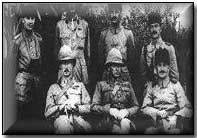Memoirs & Diaries - The End of the Siege of Kut, April 1916
 On the 22nd there was a
heavy cannonade in the morning, and we could see the bursts of H.E. [high
explosive] over a long line of a mile or more; but the result was another
disappointment, for the next day we got a communiqué to say that the R.F.
[relieving force] had not taken Sanaaiyat, but had advanced a little on the
right bank.
On the 22nd there was a
heavy cannonade in the morning, and we could see the bursts of H.E. [high
explosive] over a long line of a mile or more; but the result was another
disappointment, for the next day we got a communiqué to say that the R.F.
[relieving force] had not taken Sanaaiyat, but had advanced a little on the
right bank.
As a set-off the aeroplanes made fourteen or fifteen trips and dropped food.
It was Easter Sunday, and Trixie and I went to church in the morning. The two little rooms, still intact, were crowded with officers. Why had so many come that day? Was it to share in the joyous festival of Easter, of the resurrection of the God-plan, or was it the growing fear in our hearts that the service would be the last of its kind in Kut, and that the future was so full of uncertainty?
Be that as it may, there was a very good attendance, and after the morning service the Communion was held. One by one, in a silence that could be felt, the gaunt and war-worn defenders, with the thoughtful eyes of those who had seen much, went up each in his turn and knelt before the padre.
A deep hush fell over us all, and in those few moments men got near to their God...
On the 24th a quiver of excitement went through us when we got wind of the impending attempt of the R.F. to run the blockade that night by a boat full of food. We could hardly sleep for thinking about it, and were up on the H.Q. roof as the sun rose.
There she was, the gallant Fulnar, over against Megasis Fort, stuck in the mud just within range of our longest guns, with her splendid captain on her bridge lying dead in a pool of his own blood.
So pleased were the Turks - so one of their officers who was there told me afterwards - with the gallant bravery of poor Cowley and the other man with him on the Fulnar, that they, then and there, gave them a special military funeral in recognition of their magnificent effort, which so nearly succeeded.
But the enemy had her, and her capture sealed our fate. Deep down within us we knew we were now done for, that our people couldn't get through, and that for us it meant Baghdad, or Mosul, or God only knew where!
We did not acknowledge it yet, however, and that day another auction was held, at which prices ruled higher than ever: a box of cheroots fetched 206 rupees, and a tin of fifty Wills' cigarettes were sold for over £3 - surely the biggest money ever paid for "Three Castles"!
That night, after leaving us almost alone for a day or two, the Turks gave us a bad "strafing," and followed it up by an evening hate next day and another night bombardment, much to the discomfort of a Turkish envoy who stayed the night in the town.
They also accounted for at least one of the aeroplanes of the R.F. that had been working very hard at our food supply, but now got interfered with by the Fokkers, that had the wings of them.
On the 23rd and 24th we had eaten our first day's emergency ration split into two; on the 25th and 26th we fed on the aeroplane supply, and on the 27th we broached half of our last day's reserve ration.
The following message was received from the Armv Commander: "The C.-in-C. has desired me to convey to you and your brave and devoted troops his appreciation of the manner in which you together have undergone the suffering and hardships of the siege, which he knows has been due to the high spirit of devotion to duty in which you have met the call of your Sovereign and Empire. The C.-in-C.'s sentiments are shared by myself, General Gorringe, and all the troops of the Tigris Column. We can only express extreme disappointment, and regret our effort to relieve you should not have been crowned with success."
And so, with a farewell from our friends below, we went into captivity.
Photograph courtesy of Photos of the Great War website
Click here to read more concerning the Siege of Kut
Source: Source Records of the Great War, Vol. IV, ed. Charles F. Horne, National Alumni 1923
The first zeppelin raid on London was on 31 May 1915. Earlier raids in January 1915 had avoided London. The London raid resulted in 28 deaths and 60 injuries.
- Did you know?
